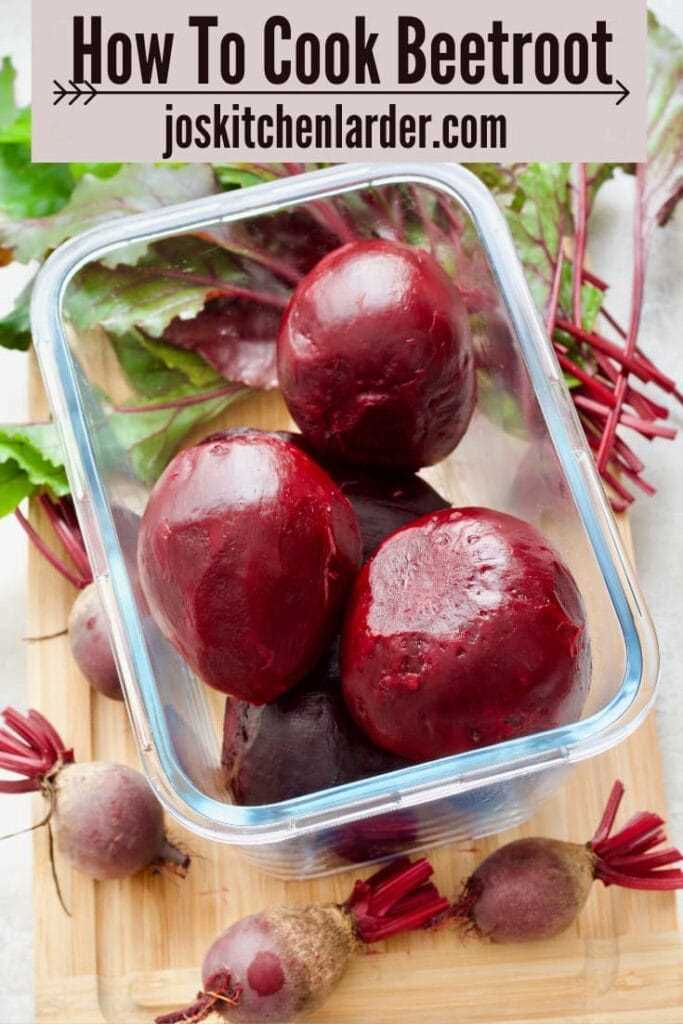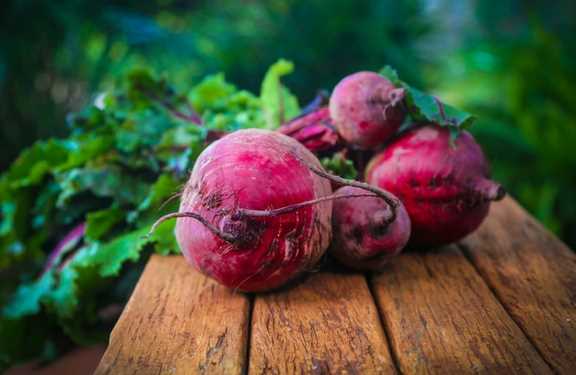Beetroot, also known as beets or simply beet, is a root vegetable that has been consumed for centuries. It is known for its vibrant red color and sweet taste, making it a popular ingredient in many dishes. While it is commonly cooked before being eaten, some people wonder if it can be consumed raw. In this article, we will explore whether or not it is safe to eat beetroot without cooking.
Raw beetroot can be consumed safely, and it even has some health benefits. When eaten raw, beetroot retains most of its nutritional content, including vitamins, minerals, and antioxidants. One of the key nutrients found in beetroot is betaine, which has been linked to improved digestion, reduced inflammation, and improved cardiovascular health.
However, it is important to note that raw beetroot can be tough and fibrous, which may not appeal to everyone’s taste buds. The texture can be quite crunchy and the flavor may be more intense compared to cooked beetroot. If you enjoy raw vegetables and don’t mind the texture, then eating raw beetroot can be a great addition to salads, sandwiches, and smoothies.
In conclusion, while it is safe to eat beetroot raw, it is a matter of personal preference. Some people may enjoy the crunchy texture and intense flavor of raw beetroot, while others may prefer the softer texture and milder flavor that comes from cooking. So, feel free to experiment and find what works best for you when it comes to incorporating beetroot into your diet.
The Benefits of Eating Raw Beetroot
Eating raw beetroot can provide a range of health benefits due to its rich nutritional profile. Beetroots are packed with essential vitamins, minerals, and antioxidants that support a healthy body.
1. Nutrient-Rich: Raw beetroot is an excellent source of essential nutrients, including folate, manganese, potassium, and vitamin C. These nutrients play a crucial role in supporting various bodily functions, such as immune system health, energy production, and cell growth.
2. Antioxidant Powerhouse: Beetroot contains powerful antioxidants, such as betalains and polyphenols, which help protect the body against oxidative stress and reduce inflammation. These antioxidants may have anti-cancer properties and promote heart health.
3. Heart-Healthy: The nitrates found in beetroot can be converted into nitric oxide in the body, which helps relax and widen blood vessels, improving blood flow and reducing blood pressure. Regular consumption of raw beetroot may help lower the risk of heart disease.
4. Digestive Health: Raw beetroot is a good source of dietary fiber, which promotes healthy digestion and prevents constipation. Fiber also helps maintain a healthy weight and supports a feeling of fullness, aiding in weight management.
5. Detoxification: Betalains found in beetroot have been shown to support liver detoxification and help eliminate toxins from the body. Including raw beetroot in your diet can support overall detoxification and improve liver health.
It is important to note that while raw beetroot has many benefits, cooking it can also provide different health benefits. Both raw and cooked beetroot can be included in a balanced diet to maximize nutritional intake and support overall health.
Nutritional Value of Raw Beetroot
Raw beetroot is a versatile and nutrient-rich vegetable that can be enjoyed without cooking. Here are some of the key nutritional benefits of raw beetroot:
Rich in Fiber
Raw beetroot is an excellent source of dietary fiber, which plays a crucial role in maintaining a healthy digestive system. It promotes regular bowel movements, prevents constipation, and supports overall gut health.
Loaded with Vitamins and Minerals
Beetroot is packed with essential vitamins and minerals. It is particularly rich in folate, vitamin C, potassium, and manganese. Folate is vital for cell growth and development, while vitamin C strengthens the immune system. Potassium helps regulate blood pressure, and manganese is essential for brain function.
In addition, raw beetroot contains smaller amounts of other important nutrients such as iron, magnesium, and vitamin B6.
Antioxidant Powerhouse

Raw beetroot is abundant in antioxidants, which help protect the body against oxidative stress. Antioxidants neutralize harmful free radicals, reducing the risk of chronic diseases like heart disease and cancer.
Supports Detoxification

Beetroot contains compounds that support the body’s detoxification processes. The betalains found in beetroot have been shown to help eliminate toxins and support liver function.
Overall, raw beetroot is a nutritious and delicious addition to a healthy diet. It can be enjoyed grated in salads, juiced, or even sliced and eaten as a snack. However, it is important to note that some people may experience digestive discomfort when consuming raw beetroot in large quantities, so it’s best to listen to your body and consume it in moderation.
Raw Beetroot for Digestive Health
Eating raw beetroot can have numerous benefits for digestive health. Beetroots are rich in dietary fiber, which aids in digestion and promotes regular bowel movements. Fiber adds bulk to the stool and helps prevent constipation.
Additionally, raw beetroots contain natural enzymes that can improve digestion. These enzymes break down complex carbohydrates, proteins, and fats, making them easier for the body to absorb. Improved digestion can also reduce symptoms of indigestion, bloating, and gas.
Moreover, raw beetroot contains a compound called betaine, which promotes the production of stomach acid. Adequate stomach acid is essential for breaking down food and absorbing nutrients effectively. By increasing stomach acid production, raw beetroot can improve overall digestive function.
It is important to note that while raw beetroot can be beneficial for digestive health, it may not be suitable for everyone. Some individuals may experience digestive discomfort or an upset stomach when consuming raw beetroots. If you have any pre-existing digestive conditions or concerns, it is advisable to consult with a healthcare professional before incorporating raw beetroot into your diet.
In conclusion, incorporating raw beetroot into your diet can have various digestive health benefits. However, it is essential to listen to your body and make sure it agrees with the raw vegetable. As with any dietary changes, it is always best to consult with a healthcare professional before making any significant alterations to your diet.
Raw Beetroot for Heart Health
Beetroot is a versatile vegetable that is not only delicious but also has numerous health benefits. One of the ways to enjoy beetroot is by consuming it raw. Raw beetroot is a great addition to your diet, especially if you are looking to improve your heart health.
Benefits of Raw Beetroot
Raw beetroot is rich in dietary nitrates, which can help lower blood pressure and improve cardiovascular health. Nitrates are converted into nitric oxide in the body, which helps to relax and dilate blood vessels, reducing the strain on the heart. This can lead to improved blood flow and decreased risk of heart disease.
In addition to the cardiovascular benefits, raw beetroot is also packed with essential nutrients. It is a good source of vitamins, minerals, and antioxidants that can support overall health and wellbeing.
Ways to Enjoy Raw Beetroot
There are many ways to incorporate raw beetroot into your diet. Here are a few ideas:
| Raw Beetroot Recipes |
|---|
| 1. Grated beetroot salad with a light dressing |
| 2. Beetroot smoothie with other fruits and vegetables |
| 3. Raw beetroot juice |
| 4. Sliced beetroot in sandwiches or wraps |
Remember to wash and peel the beetroot before consuming it raw. You can also consider adding a squeeze of lemon or a sprinkle of salt to enhance the flavor.
Overall, raw beetroot can be a tasty and nutritious addition to your diet, especially if you are aiming to improve your heart health. Experiment with different recipes and enjoy the benefits of this vibrant vegetable!
Raw Beetroot for Athletic Performance
Beetroot has gained popularity among athletes for its potential to enhance athletic performance. Many athletes consume beetroot in the form of juice or cooked dishes, but is it possible to eat beetroot raw for the same benefits?
The Benefits of Raw Beetroot
Raw beetroot offers numerous health benefits and can be a valuable addition to an athlete’s diet. It is rich in nitrates, which are converted to nitric oxide in the body. Nitric oxide helps to increase blood flow and oxygen delivery to muscles, leading to improved performance and endurance.
Additionally, raw beetroot is a great source of vitamins and minerals, including vitamin C, folate, and potassium. These nutrients are essential for energy production, muscle function, and recovery.
Incorporating Raw Beetroot into Your Diet
Here are some ideas to help you include raw beetroot in your athletic diet:
- Add grated raw beetroot to salads for a refreshing crunch and vibrant color.
- Blend raw beetroot into smoothies for a natural energy boost.
- Slice raw beetroot into thin chips and bake them for a healthy alternative to potato chips.
It’s important to note that some people may find the taste of raw beetroot too strong. In such cases, you can try mixing it with other fruits and vegetables to balance out the flavor. Experiment with different combinations until you find the one that suits your taste buds.
Remember to wash and peel the raw beetroot before consuming it to remove any dirt or impurities. Enjoy the benefits of this nutritious and natural sports supplement!
Questions and answers
Is it safe to eat raw beetroot?
Yes, it is safe to eat raw beetroot. Raw beetroot is packed with essential vitamins and minerals, and it can be a great addition to salads or juices.
Can I eat beetroot without cooking it?
Yes, you can eat beetroot without cooking it. Raw beetroot can be sliced or grated and added to salads, sandwiches, or smoothies.
What are the benefits of eating raw beetroot?
Eating raw beetroot can provide several benefits. It is a great source of dietary fiber, which aids digestion. It is also rich in antioxidants that can boost the immune system and lower the risk of chronic illnesses.
How should I prepare raw beetroot for eating?
Raw beetroot can be prepared by peeling and slicing it. You can then add it to your desired dish, such as salads, sandwiches, or even as a topping for pizzas.
Can I eat the leaves of raw beetroot?
Yes, the leaves of raw beetroot are edible and can be consumed. They are packed with nutrients like vitamins A and K, and can be used in salads or cooked as a side dish.






